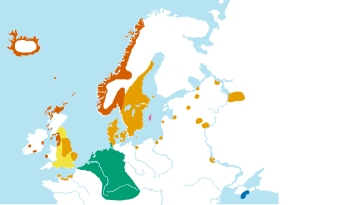English language: Difference between revisions
(adding Old Norse image) |
|||
| Line 16: | Line 16: | ||
== English word origin == | == English word origin == | ||
[[Image:Old norse, ca 900.svg|right|350px|thumb| | |||
The approximate extent of Old Norse and related languages in the early 10th century:<br> | |||
<span style="color:#fff; background:#ff0000>Old West Norse dialect</span><br> | |||
<span style="color:#fff; background:#ff9933>Old East Norse dialect</span><br> | |||
<span style="color:#fff; background:#ff00ff>Old Gutnish dialect</span><br> | |||
<span style="color:#000; background:#ffff00>Old English</span><br> | |||
<span style="color:#fff; background:#0000ff>Crimean Gothic</span><br> | |||
<span style="color:#fff; #00ff00>Other Germanic languages with which Old Norse still retained some mutual intelligibility</span>]] | |||
==== Angles / Anglo-Saxon ==== | ==== Angles / Anglo-Saxon ==== | ||
* from the Angles, a Germanic peoples who migrated to the British Islands in the 400s-600s AD. | * from the Angles, a Germanic peoples who migrated to the British Islands in the 400s-600s AD. | ||
Revision as of 16:16, 1 March 2024
English originated in Anglo-Saxo
See also Language and etymology
Word parts & types[edit | edit source]
lexemes[edit | edit source]
- noun, verb, adjective and adverb "stems" (basic word by itself
morphemes[edit | edit source]
- sounds that are added to lexemes to create new words
- including prefixes, suffixes and stem changes
- pre-, -ly, -en, -s
- including prefixes, suffixes and stem changes
English word origin[edit | edit source]

Old West Norse dialect
Old East Norse dialect
Old Gutnish dialect
Old English
Crimean Gothic
Other Germanic languages with which Old Norse still retained some mutual intelligibility
Angles / Anglo-Saxon[edit | edit source]
- from the Angles, a Germanic peoples who migrated to the British Islands in the 400s-600s AD.
- part of the Anglo-Saxon invasions
- English is one of the "Anglo-Frisian" languages
Language origins of Modern English[edit | edit source]
| Germanic | Old French | Latin | Greek | Other | Proper Names |
|---|---|---|---|---|---|
| 26% | 29% | 29% | 6% | 6% | 4% |
The most common words in English[edit | edit source]
- the
- be
- to
- and
- a
- in
- that
- have
- I
- it
notes & statistics[edit | edit source]
- of the top 20 most common words, 7 are prepositions
- the top 200 words constitute 50-60% of words used commonly used
English synonymous & part of speech word use[edit | edit source]
- the English language has a huge number of words that have multiple definitions
- other languages may be more explicit with distinct words that English will cover with a single word.
- for example:
English words & parts of speech distribution[edit | edit source]
- English contains about 600,000 words
- as counted by the Oxford English Dictionary, there are 171,476 words in current use and 47,156 obsolete words
- the Dictionary also counts 250,000 "distinct" words, excluding inflections (word ending changes)
- when word definitions are counted, English has 1,402,895 words
- i.e., the word "love" generally has five definitions in the dictionary
- when counting "headwords" and "lemmas" (words produced from a headword), English has 578,707 words
- "headword" = a word from which other words are derived, such as "break > broken > broke
- see
- as counted by the Oxford English Dictionary, there are 171,476 words in current use and 47,156 obsolete words
Parts of Speech frequency as percent of all words[edit | edit source]
parts of speech as percentage of all words[edit | edit source]
- in general, English consists of
- Adjectives: 25%
- Nouns: 50%
- Verbs: 7%
parts of speech as percentage of word usage, conversational v. formal/academic:[edit | edit source]
| Adjectives | Adverbs | Conjunctions | Determiners | Nouns | Prepositions | Pronouns | Verbs | |
|---|---|---|---|---|---|---|---|---|
| Conversational | 2.5% | 5% | 4.5% | 4.5% | 15% | 5.5% | 16.5% | 12.5% |
| Formal/ Academic | 10% | 3% | 5% | 10% | 30% | 15% | 4% | 10% |
| Adjectives | Adverbs | Nouns | Verbs | |||||
- source: The 9 Parts of Speech in English | Ginseng English (from Biber, et. al., (1999). Longman Grammar of Spoken and Written English.)